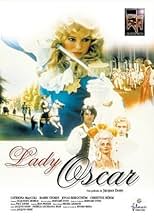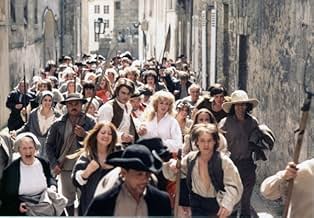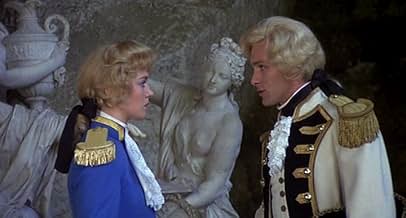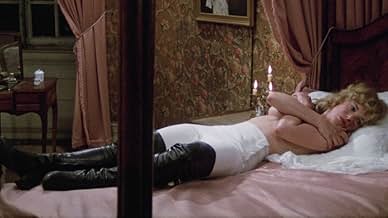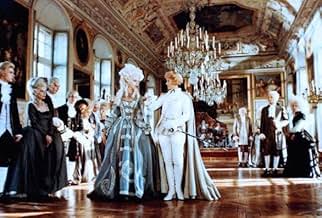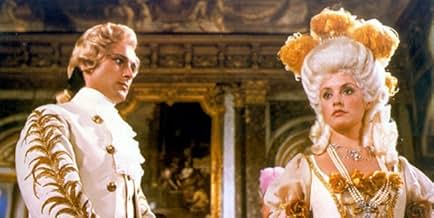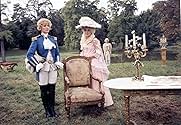Aggiungi una trama nella tua linguaThe story of Lady Oscar, a female military commander who served during the time of the French Revolution.The story of Lady Oscar, a female military commander who served during the time of the French Revolution.The story of Lady Oscar, a female military commander who served during the time of the French Revolution.
- Regia
- Sceneggiatura
- Star
Recensioni in evidenza
I've finally had the chance to watch Jaques Demy's movie - Lady Oscar. I waited so long to see it and i put so much enthusiasm on it that i almost can't bear the disappointment. As a big fan of Ryoko Ikeda, of "Berusaiyu no bara" and of the Japanese musical version of it, i have to confess: the movie HURT! The acting is so bad, the story is so cut, no fluidity between scenes ... and the end ... oh, that is really painful!!! Oscar is too cute ... no! better said: "sweet"... but OK. Marie Antoinette too stupid! Fersen .. where is Fersen??? So little appearance that i forgot he existed. Girodelle .. oh! ... disgusting! And was that brown haired girl really Rosalie? I think it was the opposite of her. The only character i can't comment on it, is Andre. He was (especially on the first part of the movie) ... he was Andree. He was human, real and acted well .. Pity he ended so stupid ... Everything in this movie have no meaning ... and some scenes are just ridiculous.
Jacques Demy's movie of Lady Oscar frequently moved me. It is not a "swashbuckler" in spirit, it does not glamourise violence; it is not a movie about "girl power". It is a tragedy that raises important questions about freedom and gender. After becoming father to a series of daughters whose mother dies in childbirth, Général de Jarjayes decides that his latest daughter will in fact be a son, Oscar, and brings her up to be an heir and defender of the de Jarjayes name. He is delighted to find her a position as bodyguard to Marie Antoinette. Oscar is unquestioning of the system into which she is inducted, a bubble of privilege, acid wit, and decadence. She is dutiful and she "knows her place". At the same time the young boy and later groom who was her companion when Oscar grew up seems to have much more class consciousness.
What her gender transformation helps to do is to de-romanticise the material, when Oscar accepts a duel, the result, devoid of machismo, comes off as a banal murder, which is precisely what it is. It is difficult to wholeheartedly see Oscar as an éoniste or transgender hero as her identity as Oscar is created for her by her father. Indeed her self-actualisation is intertwined with her accepting a more female identity. On the other hand she does use her identity as Oscar to react against male society, and becomes a role model for some of the Versailles women.
Oscar, despite adopting a male role, is not free. This is potentially quite an important point of the movie, equality and freedom are not the same thing. Her role is to hang around the wilful and indolent Antoinette, and she develops a strong sense that her life has become meaningless. To become a man is not to have meaning, it's an escape from a trap within a trap, the outer trap being the Ancien Régime in the case of this movie. When Oscar attempts to enter a regiment, her male soldiers refuse to obey her, and her superior officer gives her no support whatever. In any case the regiment only exists to suppress the people.
At a very late stage Oscar finds freedom in an act of defiance. You can feel the weight lift off her shoulders as she spends her first day as a truly free adult, despite residing in a prison cell. This feels very contemporary, freedom is something very few of us are born with, it's something we have to seize, it's profoundly personal and cathartic.
Another reviewer on this site refers to Barry Lyndon as inspiration, "Now the magic of that was its carefully spaced vacuums. It had engineered emptiness, something that only a master could do." That is definitely something Lady Oscar is attempting, in my belief it worked better than my fellow reviewer felt.
A note on historical accuracy. Thomas Jefferson described Marie Antoinette as, "...proud, disdainful of restraint, indignant at all obstacles to her will, eager in the pursuit of pleasure, and firm enough to hold to her desires, or perish in their wreck." That is exactly how she is portrayed in Lady Oscar by Christine Böhm. Jefferson also describes the relationship between the King and the Queen thus, "he had a Queen of absolute sway over his weak mind and timid virtue..." Again this seems to have been very well captured in the movie.
Lady Oscar is a politically complex movie which seems often to have been misjudged by relying on a fruitless comparative analysis with the animé and manga sources of the story. Whilst actually quite serious it does however have its gorgeous moments.
What her gender transformation helps to do is to de-romanticise the material, when Oscar accepts a duel, the result, devoid of machismo, comes off as a banal murder, which is precisely what it is. It is difficult to wholeheartedly see Oscar as an éoniste or transgender hero as her identity as Oscar is created for her by her father. Indeed her self-actualisation is intertwined with her accepting a more female identity. On the other hand she does use her identity as Oscar to react against male society, and becomes a role model for some of the Versailles women.
Oscar, despite adopting a male role, is not free. This is potentially quite an important point of the movie, equality and freedom are not the same thing. Her role is to hang around the wilful and indolent Antoinette, and she develops a strong sense that her life has become meaningless. To become a man is not to have meaning, it's an escape from a trap within a trap, the outer trap being the Ancien Régime in the case of this movie. When Oscar attempts to enter a regiment, her male soldiers refuse to obey her, and her superior officer gives her no support whatever. In any case the regiment only exists to suppress the people.
At a very late stage Oscar finds freedom in an act of defiance. You can feel the weight lift off her shoulders as she spends her first day as a truly free adult, despite residing in a prison cell. This feels very contemporary, freedom is something very few of us are born with, it's something we have to seize, it's profoundly personal and cathartic.
Another reviewer on this site refers to Barry Lyndon as inspiration, "Now the magic of that was its carefully spaced vacuums. It had engineered emptiness, something that only a master could do." That is definitely something Lady Oscar is attempting, in my belief it worked better than my fellow reviewer felt.
A note on historical accuracy. Thomas Jefferson described Marie Antoinette as, "...proud, disdainful of restraint, indignant at all obstacles to her will, eager in the pursuit of pleasure, and firm enough to hold to her desires, or perish in their wreck." That is exactly how she is portrayed in Lady Oscar by Christine Böhm. Jefferson also describes the relationship between the King and the Queen thus, "he had a Queen of absolute sway over his weak mind and timid virtue..." Again this seems to have been very well captured in the movie.
Lady Oscar is a politically complex movie which seems often to have been misjudged by relying on a fruitless comparative analysis with the animé and manga sources of the story. Whilst actually quite serious it does however have its gorgeous moments.
I've watched this movie once over ten years ago and again today. I have also watched the anime and read the manga at different parts of my life and have taken away different things at times.
The movie is called Lady Oscar but it honestly feels more like it should be called "Andre, the manservant" or something else entirely (Rose of Versailles would have been ever more appropriate than Lady Oscar), as Oscar doesn't feel like much of a centerpiece of this movie, we're hardly privy to her thoughts and feelings and it seems to be dictated and stripped of her agency but every other force.
I personally did not dislike the acting this time around, it looks and feels quite theatrical, which can be jarring since the trend has been naturalistic for a long time. The scenes though are very clumsily strung together and don't make sense if you don't have the knowledge of the manga/anime. For example near the end when we see Oscar transfer to the French Guards, they don't respect her. We don't see them again until much later when Oscar and the guards are stationed against the peasants and Oscar refuses to attack the people and the guards somehow follow her. What the movie decided not to show was the relationship Oscar built with the guards and gained their respect.
In general the movie despite being called Lady Oscar failed to show the qualities that make Oscar stand out as a character and that still stands out despite the passage of time. Oscar has a lot of internal conflict in the original source as well as physical prowess due to her training from a young age, she is also educated as she is a noble and very aware of the ideas of the revolutionaries. Instead in this movie Oscar's qualities are transferred onto Andre for some reason, elevating him to a totally different status and playing up the old tired cliche of the man saving the damsel in distress.
Regardless, I can understand that an adaptation is not always meant to be faithful and directors like to focus on specific themes of the original source and such a projected can be appreciated as a stand alone thing. This is where it hits the mark once more. This movie cannot stand alone and make sense or appear well-rounded. As I mentioned earlier the scenes are strung together clumsily and a lot of important stuff is mentioned and glossed over, and to think this movie is two hours. You cannot focus on both Marie Antoinette and Oscar in just two hours unless you do a masterful job of combining both sides, which could work I believe and of course you'd have to cut a big chunk of the manga and alter even more of it than has already been altered, which I would not be opposed to if it guaranteed a movie that could be watched, appreciated and evaluated as a stand alone piece.
Unfortunately though the movie requires you have some understanding of the happenings of the manga/anime that it refuses to spend more time on and its female lead is hardly likeable if you're a fan.
The actors also feel rather miscast, with Oscar appearing in full makeup for some reason and looking positively delicate and Andre looking quite macho despite being much more lithe in appearance and submissive in behavior. Marie Antoinette is also rather young and foolish, but her actress appears a lot older, which might be an informed choice to magnify her impulsiveness and lack of seriousness and understanding of the situation.
I feel like this would have worked a lot more as a theatrical play perhaps than a movie. For me it seems to lack the understanding of what makes the original appealing and especially a character like Oscar who you never see. And even if they decided to focus on themes instead of a character study, I feel like there are a lot more poignant movies out there with similar themes that work a lot better as a movie.
The ending was atrocious.
The movie is called Lady Oscar but it honestly feels more like it should be called "Andre, the manservant" or something else entirely (Rose of Versailles would have been ever more appropriate than Lady Oscar), as Oscar doesn't feel like much of a centerpiece of this movie, we're hardly privy to her thoughts and feelings and it seems to be dictated and stripped of her agency but every other force.
I personally did not dislike the acting this time around, it looks and feels quite theatrical, which can be jarring since the trend has been naturalistic for a long time. The scenes though are very clumsily strung together and don't make sense if you don't have the knowledge of the manga/anime. For example near the end when we see Oscar transfer to the French Guards, they don't respect her. We don't see them again until much later when Oscar and the guards are stationed against the peasants and Oscar refuses to attack the people and the guards somehow follow her. What the movie decided not to show was the relationship Oscar built with the guards and gained their respect.
In general the movie despite being called Lady Oscar failed to show the qualities that make Oscar stand out as a character and that still stands out despite the passage of time. Oscar has a lot of internal conflict in the original source as well as physical prowess due to her training from a young age, she is also educated as she is a noble and very aware of the ideas of the revolutionaries. Instead in this movie Oscar's qualities are transferred onto Andre for some reason, elevating him to a totally different status and playing up the old tired cliche of the man saving the damsel in distress.
Regardless, I can understand that an adaptation is not always meant to be faithful and directors like to focus on specific themes of the original source and such a projected can be appreciated as a stand alone thing. This is where it hits the mark once more. This movie cannot stand alone and make sense or appear well-rounded. As I mentioned earlier the scenes are strung together clumsily and a lot of important stuff is mentioned and glossed over, and to think this movie is two hours. You cannot focus on both Marie Antoinette and Oscar in just two hours unless you do a masterful job of combining both sides, which could work I believe and of course you'd have to cut a big chunk of the manga and alter even more of it than has already been altered, which I would not be opposed to if it guaranteed a movie that could be watched, appreciated and evaluated as a stand alone piece.
Unfortunately though the movie requires you have some understanding of the happenings of the manga/anime that it refuses to spend more time on and its female lead is hardly likeable if you're a fan.
The actors also feel rather miscast, with Oscar appearing in full makeup for some reason and looking positively delicate and Andre looking quite macho despite being much more lithe in appearance and submissive in behavior. Marie Antoinette is also rather young and foolish, but her actress appears a lot older, which might be an informed choice to magnify her impulsiveness and lack of seriousness and understanding of the situation.
I feel like this would have worked a lot more as a theatrical play perhaps than a movie. For me it seems to lack the understanding of what makes the original appealing and especially a character like Oscar who you never see. And even if they decided to focus on themes instead of a character study, I feel like there are a lot more poignant movies out there with similar themes that work a lot better as a movie.
The ending was atrocious.
As had been the case with Christian-Jaque's THE BLACK TULIP (1964), this is another French swashbuckler whom I first became aware of via the Japanese animated series I used to catch on Italian TV as a kid. Conversely, the film version of LADY Oscar proved to be more satisfying than that of THE BLACK TULIP, which is surprising given that the former is a maligned film within its distinguished director's canon. Having said that, along with his modernistic remake of Jean Cocteau's OPRHEE' (1950) entitled PARKING (1985), LADY Oscar had always been the one title I was most eager to catch from Demy's lean and near-invisible post-1973 period. It is ironic therefore that I have managed that feat before having acquainted myself with Demy's best-known and finest achievements of the early 1960s which is all the more remarkable when one considers that LADY Oscar was a bastard international production: a Franco-Japanese joint venture shot in English with a cast of equally mixed nationalities and whose tangled worldwide distribution rights have made it impossible for even the British Film Institute to secure a screening in their renowned National Film Theatre in London for a 'complete' Jacques Demy retrospective in November 2007! Therefore, all the more power to Yamato Video, the Italian DVD production company who specializes in releasing vintage Japanese anime series (that were all the rage on Italian TV as I was growing up in the 1980s and early 1990s) for succeeding where others have failed; a gallery of trailers from their catalogue is available as a supplement on the LADY Oscar disc and watching it was "a blast from the past" for me as the saying goes!
Anyhow, back to the film at hand: the fairy-tale qualities of the historical narrative are ideal hunting grounds for Demy, who had already brought DONKEY SKIN (1970) and THE PIED PIPER (1972) to the screen although, in this case, he drew inspiration from a Japanese comic strip rather than a local legend (albeit set in his native land). Needless to say, the film is a feast for the eyes when it comes to sets (some of the exteriors were actually shot on the Versailles Palace grounds) and costumes but, even if the work of Demy here seems not be counted among his finest achievements, a couple of elegantly sweeping camera movements (the clandestine meeting in the abandoned château between Queen Marie Antoinette and her Swedish lover) and well-mounted sequences (the vigorous fist-fight in the tavern) are certainly noteworthy; the same applies to the musical contribution of Demy's regular composer Michel Legrand. If there are distinct flaws, it's that the film moves at rather too deliberate a pace (with a running time of just over two hours) and has a needlessly unhappy ending.
In spite of the title, the narrative incorporates three parallel story lines that give a more sweeping picture of the tumultuous times it depicts (starting out in 1755 with the birth of Oscar and culminating in the storming of the Bastille that led directly to the French Revolution of 1789): Oscar's father had long wanted a male heir to follow him into his military career and when his wife dies in giving birth to yet another female, he determines to make a man of his newborn child regardless; while Oscar is eventually recruited as personal guard to Marie Antoinette, we follow the amorous exploits of the latter as well as the rise of one female peasant into aristocracy through devious schemes and callous behavior to her true peers (perhaps in emulation of the notorious Madame Dubarry whose name is mentioned at one point). In view of its origins as light-hearted kiddie fare, there is a surprisingly subversive undercurrent of sexual ambiguity in Oscar's imposed masculinity (and the fact that this starts a cross-dressing fad among the upper classes), the repressed feelings for her shown by the stable boy she grew up with, the full-blown kiss on the lips Oscar gives during her own supposed engagement party to a giggling young lady she's dancing with, etc.
Catriona MacColl looks just ravishing in the title role, both when dressed in her military outfit and also when she occasionally gives in to her womanhood (including a brief topless bit); this was her first film and arguably her best role since only another appearance for Demy and three in Lucio Fulci horror films including CITY OF THE LIVING DEAD (1980) for which she even recorded an exclusive audio commentary for its R2 DVD! really stick out from the rest of her filmography. Another beguiling presence in the film is undoubtedly that of Christine Bohm who plays Marie Antoinette; unlike MacColl (despite their being the same age), LADY Oscar proved to be her last film as she tragically died at 25 in an accident that same year. As for the male cast, the most prominent are Barry Stokes (as Oscar's stable boy companion and true love) and Martin Potter (as her jaded, titled but short-lived fiancé); incidentally, while they both had their artistic triumphs for major directors in Juan Antonio Bardem's THE CORRUPTION OF CHRIS MILLER (1973) and Federico Fellini's FELLINI - SATYRICON (1969) they each also worked for cultish British exploitation film-maker Norman J. Warren in, respectively, PREY (1978) and SATAN'S SLAVE (1976)!!
P.S. My amiably lazy feline pet goes by the name of "Lady Oscar": I had originally dubbed it Oskar in tribute to one of my favorite foreign films THE TIN DRUM (1979) because, like its protagonist, my cat seems to have stopped growing of its own accord (while that of my aunt, which is of a similar breed and only a year or so older, has become quite huge!); my mother, unaware of this connection, insists on calling her "Lady" because, first of all, it's a female and, frankly, really does act royally and has the genuine impression that we're there to wait on it!!
Anyhow, back to the film at hand: the fairy-tale qualities of the historical narrative are ideal hunting grounds for Demy, who had already brought DONKEY SKIN (1970) and THE PIED PIPER (1972) to the screen although, in this case, he drew inspiration from a Japanese comic strip rather than a local legend (albeit set in his native land). Needless to say, the film is a feast for the eyes when it comes to sets (some of the exteriors were actually shot on the Versailles Palace grounds) and costumes but, even if the work of Demy here seems not be counted among his finest achievements, a couple of elegantly sweeping camera movements (the clandestine meeting in the abandoned château between Queen Marie Antoinette and her Swedish lover) and well-mounted sequences (the vigorous fist-fight in the tavern) are certainly noteworthy; the same applies to the musical contribution of Demy's regular composer Michel Legrand. If there are distinct flaws, it's that the film moves at rather too deliberate a pace (with a running time of just over two hours) and has a needlessly unhappy ending.
In spite of the title, the narrative incorporates three parallel story lines that give a more sweeping picture of the tumultuous times it depicts (starting out in 1755 with the birth of Oscar and culminating in the storming of the Bastille that led directly to the French Revolution of 1789): Oscar's father had long wanted a male heir to follow him into his military career and when his wife dies in giving birth to yet another female, he determines to make a man of his newborn child regardless; while Oscar is eventually recruited as personal guard to Marie Antoinette, we follow the amorous exploits of the latter as well as the rise of one female peasant into aristocracy through devious schemes and callous behavior to her true peers (perhaps in emulation of the notorious Madame Dubarry whose name is mentioned at one point). In view of its origins as light-hearted kiddie fare, there is a surprisingly subversive undercurrent of sexual ambiguity in Oscar's imposed masculinity (and the fact that this starts a cross-dressing fad among the upper classes), the repressed feelings for her shown by the stable boy she grew up with, the full-blown kiss on the lips Oscar gives during her own supposed engagement party to a giggling young lady she's dancing with, etc.
Catriona MacColl looks just ravishing in the title role, both when dressed in her military outfit and also when she occasionally gives in to her womanhood (including a brief topless bit); this was her first film and arguably her best role since only another appearance for Demy and three in Lucio Fulci horror films including CITY OF THE LIVING DEAD (1980) for which she even recorded an exclusive audio commentary for its R2 DVD! really stick out from the rest of her filmography. Another beguiling presence in the film is undoubtedly that of Christine Bohm who plays Marie Antoinette; unlike MacColl (despite their being the same age), LADY Oscar proved to be her last film as she tragically died at 25 in an accident that same year. As for the male cast, the most prominent are Barry Stokes (as Oscar's stable boy companion and true love) and Martin Potter (as her jaded, titled but short-lived fiancé); incidentally, while they both had their artistic triumphs for major directors in Juan Antonio Bardem's THE CORRUPTION OF CHRIS MILLER (1973) and Federico Fellini's FELLINI - SATYRICON (1969) they each also worked for cultish British exploitation film-maker Norman J. Warren in, respectively, PREY (1978) and SATAN'S SLAVE (1976)!!
P.S. My amiably lazy feline pet goes by the name of "Lady Oscar": I had originally dubbed it Oskar in tribute to one of my favorite foreign films THE TIN DRUM (1979) because, like its protagonist, my cat seems to have stopped growing of its own accord (while that of my aunt, which is of a similar breed and only a year or so older, has become quite huge!); my mother, unaware of this connection, insists on calling her "Lady" because, first of all, it's a female and, frankly, really does act royally and has the genuine impression that we're there to wait on it!!
I love the Rose of Versailles (Lady Oscar in West) original comics and was a pleasure to watch this movie. However it's necessary to say it's just for fans. When you previously know the characters and want to get in touch with an alternative point of view, it's OK, but if you take Lady Oscar as a movie about the French Revolution's or a cross dresser heroine, you probably would feel disappointed.
The work was not as good as it would be; some actors and actresses were not well chosen; main events were forgotten; and Oscar's personal drama lost force. But as I said, I liked it a little, because any Lady Oscar's product would attract me.
The work was not as good as it would be; some actors and actresses were not well chosen; main events were forgotten; and Oscar's personal drama lost force. But as I said, I liked it a little, because any Lady Oscar's product would attract me.
Lo sapevi?
- QuizThe major sponsor of the film was the Japanese cosmetics company Shiseido. Catriona MacColl (Oscar) promoted a red lipstick for the spring cosmetic line that year.
- BlooperIn the ballroom scene we see a string quartet and a harpsichordist. However, we hear the soundtrack of a string orchestra.
- ConnessioniFeatured in L'univers de Jacques Demy (1995)
I più visti
Accedi per valutare e creare un elenco di titoli salvati per ottenere consigli personalizzati
- How long is Lady Oscar?Powered by Alexa
Dettagli
- Tempo di esecuzione2 ore 4 minuti
- Mix di suoni
- Proporzioni
- 2.35 : 1
Contribuisci a questa pagina
Suggerisci una modifica o aggiungi i contenuti mancanti


